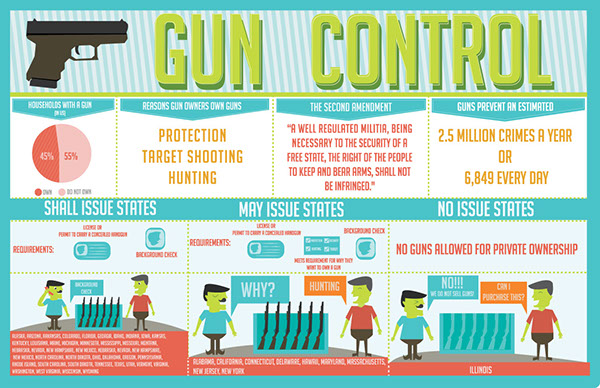Holes in the gun control system
How people are still managing to get guns despite restrictions

Photo courtesy of Student Show
Pictured above is an info graphic of gun control laws.
September 17, 2019
Over Labor Day, I was on a trip to Atlanta for a family weekend when a shocking incident occurred. What was supposed to be a fun day of shopping at the mall turned into horror and disbelief when there was a gang fight that led to guns being pulled. People ran into dressing rooms chaotically to try and obtain shelter. Whether it’s at festivals, malls or even in schools, shootings occur everywhere. Safety is considered one of the basic needs of a human being on Maslow’s Hierarchy of Needs. However, it is nearly impossible to be truly safe in a country where guns are a big part of our society.
With all the so-called restrictions on who is allowed to own a gun it seems odd that people with criminal records or mental illnesses walk around with guns that are legally purchased. Many restrictions in place, such as mental illnesses or the age limits, have certain ways around them that makes access to a gun simpler than it should be.
One of the most commonly known ways that restricted people get access to a firearm is referred to as the gun-show loophole. The Bureau of Alcohol, Tobacco and Firearms estimates that about 2,500-5,000 gun-shows are held annually. Of the sellers at these events, around 25%-50% are not licensed. Unlicensed sellers are not required to perform background checks or keep records on their gun sales. This means that people who would normally be held back from buying a gun, such as convicted felons or juveniles, are able to obtain guns at these shows. The super easy fix to this problem would simply be to require all sellers to perform background checks. If a person really thinks that the two minute instant background check is not worth the safety of dozens of people then they’re probably not people who should be allowed to sell firearms.
The background check itself is another area that’s riddled with flaws. In an ideal world, the FBI’s database background check would have a definitive list of people who cannot own a firearm such as convicted felons, people who have been diagnosed with mental illnesses, abusers and juveniles. However, we clearly do not live in a perfect world. In reality, it’s up to local police, the military, federal and state courts and sometimes hospitals to provide this information. Many do not know what to send and most states lack the funds to handle the data. The amount of tragedies that have occurred due to information being omitted is astonishing.
Furthermore, most states don’t have the institutions in place to find out who is or isn’t sending the data needed to perform accurate background checks, including Virginia. One of the most tragic examples of this occurred at Virginia Tech in 2007 when a student shot and killed 32 people and injured 17 more before committing suicide. Despite having a history of mental illnesses, he was still able to purchase firearms through two licensed dealers with two different background checks. The fact that a man who had serious mental health issues was able to pass two different background checks is disgusting and very telling about how effective our gun control system is. It is impossible to enforce firearm restrictions without proper information being loaded into the databases.
One of the biggest problems with the distribution of firearms is how people with mental health issues are getting them. Under federal law, people are only restricted from buying a gun if they have been committed to a mental institution or have been adjudicated as mentally defective by a court of law. Many agencies are clueless as to what kind of information to send to the National Instant Criminal Background Check System (NICS) that doesn’t contradict with doctor-patient confidentiality. It is difficult to know what or what not to send with federal medical privacy laws in place. Around 15 states are trying to improve the background check system, but they are clearly failing to do so with how many shootings occur despite NICS.
One solution that many gun rights activists try to advertise is the idea of a good guy with a gun. The ideology that formed this concept is that the only way to stop a bad guy with a gun is to have a good guy with a gun. Concealed carry is the practice of carrying a weapon in public in a concealed manner. People think that through this they can possibly help in dangerous situations. However, as of now there’s no evidence that concealed carry either increases or reduces violent crime rates. Also, the recent El Paso shooting doesn’t make this idea very convincing. In this incident, a man walked into a Walmart with the horrifying goal of shooting as many Mexicans as he could. Armed civilians who intervened only made casualty rates higher. With the amount of chaos already in place during a shooting, I don’t see how it could help to fight fire with more fire.
With all the gaps, loopholes and errors in the gun control system, it is amazing how anyone is restricted from buying a gun. Many of these issues require basic fixes such as a more formal report system or universal background checks. Until these issues are addressed and changed, safety in America can’t be a reality.






